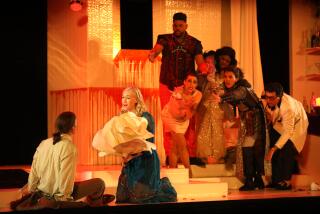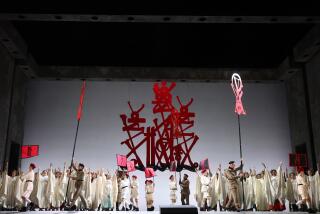A ‘White Rose’ Blooms From Troubled Earth : Memories of Blood and the Rose
- Share via
When the Long Beach Opera invited Dr. George J. Wittenstein to a rehearsal of the opera “White Rose” at a Hollywood church, he was hesitant.
For one thing, he said later, he was not eager to relive the era that the opera deals with: “I was concerned that I would become too much involved emotionally. (The story) has a very profound effect.”
For another, he had--and still has--reservations about the way the “White Rose” story has been told in various media over the years.
It is a story with a deeply personal meaning to George Wittenstein. He was a friend of Hans and Sophie Scholl’s, the opera’s two principal characters, and, like them, he risked his life in the White Rose organization to protest against the Nazis in wartime Germany.
The Scholls lost the gamble. They, Wittenstein and four other colleagues distributed anti-Nazi leaflets in Munich, the physician said. He was the only one to escape execution.
The 69-year-old Wittenstein--a professor of surgery at UCLA, director of surgery at Olive View Medical Center in Sylmar and a naturalized American since 1954--decided to go the rehearsal despite his concerns.
Afterward, he shared his own version of the historical events and his impressions of the opera’s version.
“I can only stress that there were not just two people (the Scholls, involved)--there were many, many more,” Wittenstein said, adding that there were anti-Nazi resistance groups in at least five German cities.
And, he said, as much as he welcomes the recognition given the Scholls over the years, there were others who were of equal if not greater importance in the White Rose protest against Hitler.
Wittenstein is quick to add, however, that the Scholls “were most inspiring and gave impetus to the whole thing.”
Wittenstein met Hans Scholl and other members of the White Rose when he was in medical school at the University of Munich in pre-war Germany.
They gathered first as friends and scholars to share their writings and their appreciation for literature, art and music. But in the late 1930s, as the civil rights of citizens were stripped away by the Nazi regime and German soldiers were slaughtered in battle, members of the White Rose decided something had to be done to end the war.
The students secretly procured a mimeograph machine, paper and enough stamps to began printing and distributing leaflets in May, 1942.
The first four editions of leaflets, Wittenstein said, were mainly philosophical and quoted from classic literary figures such as Goethe and Schiller. But in the fifth, he said, the tone altered dramatically, becoming politically radical.
The leaflet’s title changed from “The Leaves of the White Rose” to “The Leaves of the German Resistance Movement.”
“The aim was to make the Germans wake up,” Wittenstein said, stressing that the decision “to do something about National Socialism and Hitler” was a product of the entire group.
At one point, Wittenstein said, the group hoped for the overthrow of Hitler’s government and for negotiation of peace with the Allies. But as the war dragged on, it became clear “that the only way (for Germany) to be free was to lose the war,” he said.
As a member of the White Rose, he carried leaflets to Berlin. He also edited two editions. It was during distribution of the final leaflet, the one that called on Germans to turn against Hitler, that the Scholls were arrested. Soon after, they were executed.
Wittenstein said he doesn’t think the activities of the White Rose really changed the situation in Germany.
But he said the work of the organization was not without value.
“The reason . . . is simply because it provided enough hope and trust and belief both for the Allies and the Germans themselves that there were good Germans. That not everybody in Germany was a Nazi and there were people in Germany who stood up for their convictions.”
Of the plot of the “White Rose” opera, Wittenstein said: “There is a contradiction. It’s totally fictitious and yet it’s factual.
“Of course nobody knows what they (the Scholls) thought; nobody knows what they said (in prison). They certainly didn’t say anything to each other because they were not permitted to see each other. And yet everything they say (in the opera) is based on what’s in the leaflets and in their diaries, and therefore it’s factual.”
More to Read
The biggest entertainment stories
Get our big stories about Hollywood, film, television, music, arts, culture and more right in your inbox as soon as they publish.
You may occasionally receive promotional content from the Los Angeles Times.










